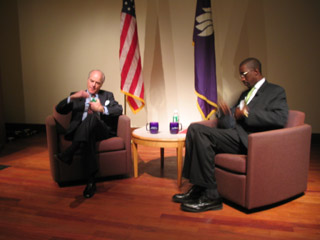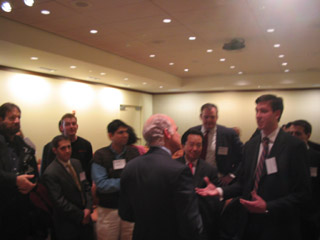events
 |
(Wordcount: 1,002) Just what does an executive, who's every utterance can move markets or affect global business trends, have to say? As much as I dislike making any human being sound like a demi-god, there are no other adjectives to fully capture the magnitude of Mr. Henry Kravis and his contributions to modern business. The topics we intended to cover were Mr. Kravis's interests in entrepreneurship, philanthropy, and education. What we got was a whole lot more.
The Beginning
Born humbly to a warm and enterprising family in Tulsa, Oklahoma, his parents instilled in him the three values that would propel Mr. Kravis's into the history books: an appreciation of education, a sense of giving back, and the self-worth to make his own choices in life, which he refers to as being a self-starter. His dad further encouraged Henry to meet everyone and never be afraid to ask them anything. In other words, network your brains out.
If you don't already know his biography, he received a BA in Economics at Claremont McKenna College, worked briefly at the bottom of Goldman as a runner and later, as an analyst, got an MBA at Columbia, then VP at Katy Industries, then Bear Stearns where he became a partner doing what were small and obscure deals. In 1976, he left Bear to start his own fund with his mentor Kohlberg and cousin Roberts. The rest is history. What you may not have realized is that getting his first fund off the ground was a tremendous effort because the concept of leveraged buy-outs was too new for many. But more interesting, the deep institutional pockets he approached for funding all wanted control or majority ownership of his fund. KKR also envisioned multiple deals per year as opposed to the one deal per year investors were accustomed to seeing, which, according to Mr. Kravis, his early investors questioned the logic of (amazing, I know). KKR refused all these crimping conditions until they found an investor willing to see it their way - Henry Mills (an early investor in Kleiner Perkins Caufield & Byers according to Mr. Kravis). KKR's business model subsequently went on to add the term "LBO" to the financial world's vernacular.
The Firm
Lessons they've applied include: staying the course - it's no secret that when KKR makes an investment, it's not for a quick buck. They fix up what needs to be fixed, make sure the business is healthy, then sell it for a return.
Never get emotional - Gordon Gekko probably learned this one from Mr. Kravis; when it's time to cut it loose, you just have to cut it loose.
Do your work without fanfare - Mr. Kravis's quote suffices: "Whales who come up and spout off get harpooned."
And, a well-worn epiphany: think global, act local - this includes hiring local talent and addressing every region with respect, not American attitude. As an aside, he pointed out the higher degree of risk-aversion in other parts of the world. In these places, they don't tolerate mistakes as easily as they do in the U.S., and ironically, it's also not proper to be overly prosperous - socialism at its finest.
Because this was an event for "students", it was worth asking about KKR's hiring practices. KKR works with hungry, creative, experienced and diverse team players, who leave their egos at home and work hard without cutting corners. Solid operators who pay close attention to details are prized.
The first time I heard Mr. Kravis speak, it was in the midst of a lot of talk about succession planning. Private equity firms are keenly aware of the significance of this problem as almost all the great ones are still managed by their founders. Talent flight has added to the succession pressure cooker, as the young turks don't feel the old turks will ever retire. In this context, Mr. Kravis' remarks seemingly emphasized loyalty to the firm and longevity with the firm as being profoundly important to him. But the real challenge is that the sort of "turks" KKR needs are precisely the ones that don't intend on working under someone else's roof indefinitely, especially if the builder is still living. (Even McKinsey, Morgan, and Skadden died before their successors were able to take their firms to the next level).
 |
Validation
At the conclusion of the event, the interviewer, Prof. Jeffrey Robinson, gave me a gift: the biography of Reginald Lewis, an African-American with the distinct honor of being the first filthy-rich black guy in America. (No, BET's Bob Johnson and Oprah weren't the first.) His path lead him to Mr. Kravis; Prof. Robinson read the book in preparation for his interview.
Realize that Mr. Kravis's circumstances as a youth may have been different than Mr. Lewis', but it's their unwavering self-worth that irrevocably lead them both to the top. There is no greater validation for all the sacrifices one must make to achieve what one wants than to be a witness to the lives of giants and find so many similarities between oneself and those giants. So, as you may have guessed, as I read the first few pages of the book called, "Why Should White Guys Have All The Fun", I felt as though I was reading a history of things I had not yet done, but was fated to do. Life has certainly thrown me a few curve balls, as it has all of us, but it sure feels good knowing you're not the only one going through life like a three-legged dog on an ice-rink.
Conclusion
There was plenty of deal
talk (I know you're salivating), as well as his personal views on various industries
and business personalities; a presentation more valuable than a "sure-fire"
stock tip. With hundreds of deals in his head, I was thunderstruck at Mr. Kravis's
ability to recall so many with such accuracy - including names. But, since the
event was intentionally not captured on video, what was said in the room will
stay in the room.
Enjoy more photos of the event >>